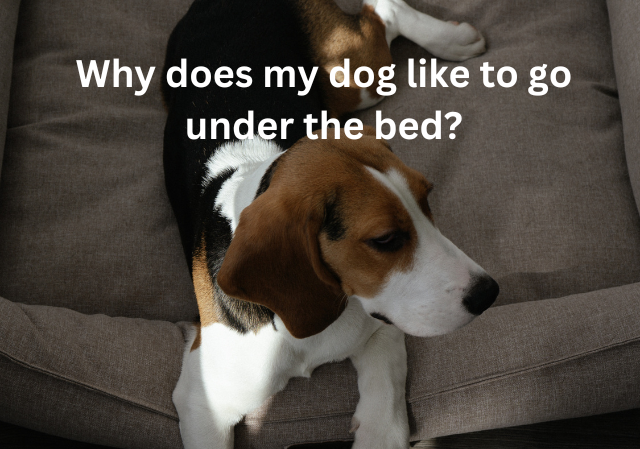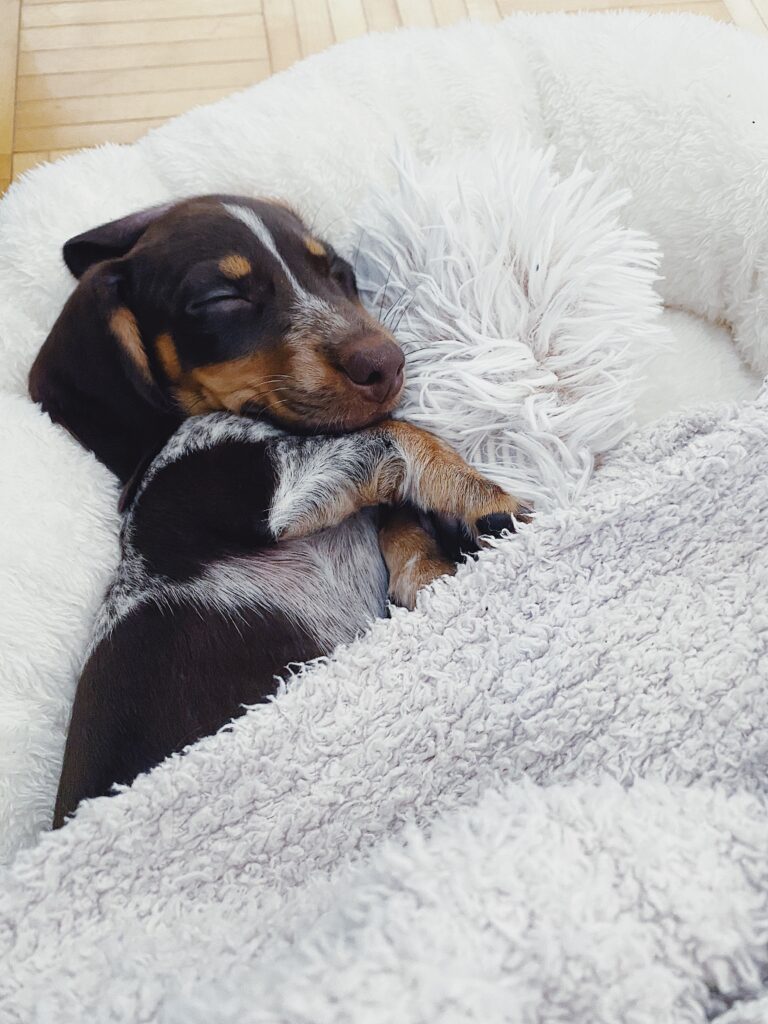Curious about your furry friend’s mysterious hiding spot under the bed? Unveiling the secrets behind this puzzling behavior, we explore why dogs have an undeniable fascination with slipping beneath those cozy sheets.
From their primal instincts to a need for security and comfort, there’s more to it than meets the eye. Join us on a captivating journey to uncover the hidden motivations and intriguing reasons why your dog finds solace under the bed.
Get ready to gain a deeper understanding of your canine companion and discover the fascinating world of their under-bed sanctuary.

It’s time to demystify this enigmatic behavior once and for all!
The Root of the Behavior
There can be several reasons why your dog enjoys going under the bed. One possible explanation is that the space under the bed provides a sense of comfort and security.
Dogs have an instinctual desire for a den-like environment, and the enclosed area under the bed can replicate that feeling. It gives them a cozy and enclosed space where they can retreat to and feel safe.
Another reason could be temperature regulation. Dogs have a higher body temperature than humans, and they may seek out cooler areas to rest. The space under the bed can be cooler due to limited airflow, making it a desirable spot for your dog, especially during hot weather.
Furthermore, going under the bed may allow your dog to reduce their exposure to stimuli from the environment.
By seeking this secluded spot, they can find a refuge where they have some privacy and can have a break from social interactions or overwhelming situations.
Additionally, the behavior might stem from a shelter instinct. In the wild, dogs and their ancestors would often seek shelter in enclosed spaces to protect themselves from predators or harsh weather conditions.
This instinctual behavior could still be present in your dog, causing them to gravitate towards the secure and sheltered space under the bed.
It’s important to note that each dog is unique, and the reasons for seeking the space under the bed may vary.
Understanding your dog’s specific preferences and observing their behavior cues can provide further insight into why they exhibit this behavior.
Encouraging the Behaviour
If your dog likes to go under the bed, there are a few factors that could be encouraging this behavior.
Dogs are often motivated by rewards and reinforcement, and if they receive positive experiences or outcomes while being under the bed, they are more likely to continue seeking out that space. Here are a few potential reasons:
Comfort and relaxation: The space under the bed may provide a comfortable and soothing environment for your dog. If they find it cozy and relaxing, they may naturally be drawn to it for rest and relaxation.
Attention and interaction: If your dog goes under the bed and receives attention or interaction from you or other household members, it can reinforce the behavior.
They may have learned that going under the bed leads to increased attention or playtime, and therefore, they repeat the behavior to seek that social interaction.
Escape from undesirable situations: Dogs may seek refuge under the bed when they want to escape from stressful or unpleasant situations.
For example, if there are loud noises, unfamiliar guests, or other pets in the house, going under the bed can provide a sense of security and help them cope with the situation.
Previous positive experiences: If your dog has had enjoyable experiences under the bed in the past, such as finding a hidden toy or receiving treats, they may associate that space with positive outcomes.
This positive reinforcement can strengthen the behavior and make them more likely to continue seeking it out.
Understanding the factors that encourage the behavior can help you determine how to approach it.
If you want to discourage your dog from going under the bed, providing alternative comfortable spaces, ensuring they have positive experiences elsewhere, and redirecting their attention can be helpful.
However, if there are no negative consequences or concerns associated with your dog going under the bed, it may be perfectly fine to allow them to continue enjoying that space.
Reason Why does my dog like to go under the bed?
1. They Love Private Spaces
Dogs love private spaces, and the area under the bed offers them just that. It provides a secluded and enclosed environment where they can retreat and feel secure.
The sense of privacy and solitude under the bed appeals to their natural instincts and provides them with a cozy spot to relax.
2. They’re Afraid
One possible reason why your dog likes to go under the bed is that they may be afraid.

The enclosed space under the bed offers them a sense of safety and protection from perceived threats or anxiety-inducing stimuli. It serves as a refuge where they can seek comfort and alleviate their fears.
3. They’re Physically Ill or Injured
Another reason why your dog may like to go under the bed is that they could be physically ill or injured.
When dogs are not feeling well or experiencing discomfort, they may seek out a quiet and secluded space like under the bed.
It provides them a place to rest, recover, and minimize external stimulation that could exacerbate their condition.
Here you can check out how to stop your dog from pooping in your bed.
4. They’re Looking For Food
One possible reason why your dog likes to go under the bed is that they could be looking for food.
Dogs have a strong sense of smell, and if they detect any food crumbs or leftovers that may have fallen under the bed, they will be motivated to investigate and potentially find a tasty snack.
5. They’ve Found Something They Shouldn’t Have
Another reason why your dog may like to go under the bed is that they might have found something they shouldn’t have.
Dogs are curious creatures, and if they come across an item they consider interesting or enticing, they may take it to their chosen hiding spot under the bed to investigate or keep it away from others.
6. They Sense a Change in the Environment
One reason why your dog may like to go under the bed is that they sense a change in the environment.
Dogs are perceptive to changes in their surroundings, such as new smells, sounds, or even rearranged furniture.
Going under the bed allows them to retreat and observe the changes from a safe and secluded vantage point.
7. Provides a Cool Environment
Another reason why your dog may like to go under the bed is that it provides a cool environment.
Dogs have a higher body temperature than humans, and the space under the bed often has limited airflow, creating a cooler spot for them to rest and escape the heat, especially during warm weather.
8. Anxiety and Fear
One reason why your dog may like to go under the bed is due to anxiety and fear.
Dogs with anxiety may seek out enclosed spaces like under the bed as a way to feel more secure and protected.
The confined area can help them cope with their anxious feelings and provide a sense of comfort.
9. Your Dog is Sick
One possible reason why your dog likes to go under the bed is that they may be feeling sick.
When dogs are unwell, they often seek out a quiet and secluded place to rest and recover.

Going under the bed provides them with a private space where they can find comfort and try to alleviate their symptoms.
10. There’s No Alternative Spot
One reason why your dog may like to go under the bed is that there may not be an alternative spot available to them.
If your dog doesn’t have access to a designated bed or a comfortable resting area, they may naturally gravitate towards the space under the bed as the next best option for relaxation and retreat.
11. It’s a comfortable den
One reason why your dog may like to go under the bed is that it serves as a comfortable den-like space for them.
Dogs have an instinctual desire for a den, a secure and enclosed area where they can feel safe and cozy.
The space under the bed provides a similar environment that fulfills their natural denning instincts.
12. Your pet just needs some space
One reason why your dog may like to go under the bed is that they simply need some space.
Dogs, like humans, have their own individual preferences and moments when they desire solitude.
Going under the bed allows them to have a quiet and personal space where they can relax and have time to themselves.
Here you can check out why your dog leave your bed at the middle of the night.
13. Your dog wants to be close to you.
One reason why your dog may like to go under the bed is that they want to be close to you.
Dogs are social animals and often seek the presence of their human companions. By going under the bed, they may feel a sense of proximity to you, even if they cannot physically be right beside you.
14. Your Dog Is Avoiding You
One reason why your dog may like to go under the bed is that they are avoiding you.
Dogs may go under the bed if they want to hide or avoid interaction with their owners or other individuals in the household. It could be a sign of shyness, fear, or a desire for some alone time.
15. Your Dog Is Hiding Something
One reason why your dog may like to go under the bed is that they are hiding something.
Dogs have a natural instinct to hide or protect their prized possessions, such as toys, bones, or even stolen items. Going under the bed provides a concealed location where they can safeguard their treasures from others.
Why Is My Dog Suddenly Sleeping Under the Bed?
They Want to Cool Down
If your dog is suddenly sleeping under the bed, one possible explanation is that they want to cool down.
Dogs regulate their body temperature differently than humans, and they may seek out cooler areas when they feel overheated.
The space under the bed often has limited airflow, creating a cooler microclimate that can help them cool down. It’s their way of finding comfort and maintaining a comfortable body temperature during warmer periods.
Separation Anxiety
If your dog is suddenly sleeping under the bed, it could be due to separation anxiety. Dogs with separation anxiety may seek out enclosed spaces as a way to feel more secure and alleviate their anxiety when they are left alone.
The area under the bed offers a secluded and safe environment where they can retreat and find comfort in your absence.
Sleeping under the bed allows them to create a den-like space, providing a sense of security and reducing their anxiety levels.
Stressful Environment
If your dog is suddenly sleeping under the bed, it could be a response to a stressful environment. Dogs are sensitive to changes and stressful situations, such as loud noises, unfamiliar guests, or disruptions in their routine.
The space under the bed provides a secluded and enclosed area where they can retreat and feel protected from external stressors. Sleeping under the bed allows them to create a safe haven and find solace in a quieter and more secure environment.
Your Dog Isn’t Feeling Well
If your dog is suddenly sleeping under the bed, it could be a sign that they are not feeling well. Dogs often seek out quiet and secluded spaces when they are unwell or experiencing discomfort.
Sleeping under the bed allows them to find a cozy and enclosed spot where they can rest and recover.
It may be a way for them to minimize external stimuli and create a comfortable environment to alleviate any physical or emotional symptoms they may be experiencing.
Should You Be Worried If Your Dog Is Sleeping Under the Bed?
If your dog is sleeping under the bed, it is not necessarily a cause for immediate concern. Dogs have different preferences when it comes to finding a comfortable sleeping spot, and the space under the bed may simply provide them with a cozy and secure environment.
However, it’s important to observe your dog’s overall behavior and health.
If your dog shows signs of distress, illness, or exhibits changes in eating, drinking, or bathroom habits, it may be wise to consult with a veterinarian to ensure there are no underlying health issues contributing to their behavior.
How To Get Your Dog Not To Hide Under Things
Know Your Dog
To prevent your dog from hiding under things, it’s important to understand their behavior and address any underlying causes. Start by observing when and why your dog seeks out those hiding spots. Provide alternative comfortable spaces, such as a designated dog bed or crate, to meet their need for security.
Create a positive association with these spaces through treats, toys, or gentle encouragement.
Gradually expose your dog to new environments and experiences, using positive reinforcement to build confidence and reduce the need for hiding. Consult with a professional dog trainer or behaviorist for personalized guidance.
Put up a barrier
To discourage your dog from hiding under things, you can put up a physical barrier to block access to those areas. Use baby gates, furniture blockers, or create designated “no-go” zones. Redirect your dog’s attention to more suitable areas such as their bed or a cozy corner with blankets.
Provide enrichment activities, interactive toys, and positive reinforcement to keep them engaged and entertained.
Consistency, patience, and positive reinforcement are key to guiding your dog towards alternative and more appropriate hiding behaviors.
Here you can see why your dog dig your bed at night.
Reward positive behavior
To prevent your dog from hiding under things, focus on rewarding positive behavior. When your dog chooses not to hide and instead stays in an open area or comes out from under furniture, praise and reward them with treats or verbal praise.
This positive reinforcement helps them associate staying out in the open with positive outcomes.
Additionally, create a comfortable and inviting environment with cozy dog beds, toys, and interactive activities to encourage them to spend more time in those areas instead of seeking hiding spots.
Crate your pup at night
Crating your dog at night can be an effective way to prevent them from hiding under things. A crate provides a secure and designated space for your dog to sleep, reducing the desire to seek hidden spots. Gradually introduce your dog to the crate using positive reinforcement, such as treats and praise.
Make the crate comfortable with soft bedding and toys. Use the crate consistently during nighttime and gradually extend its use during daytime when you’re away, helping your dog feel safe and secure outside of hiding spots.
Visit the Vet
If your dog consistently hides under things and it becomes a concerning behavior, it is advisable to visit a veterinarian.
Sudden changes in behavior may be an indication of an underlying health issue or pain. The vet can conduct a thorough examination to rule out any medical conditions that may be causing the behavior.
They can also provide guidance and recommend appropriate training or behavior modification techniques to address the hiding behavior effectively.
Find a Sleeping Alternative
To encourage your dog to find a sleeping alternative to hiding under things, provide them with a comfortable and inviting sleeping area. Invest in a cozy dog bed or create a designated space with soft blankets and pillows.

Make it a positive and rewarding experience by offering treats, toys, or praise when they choose to use the designated sleeping area. Redirect their attention to this spot and consistently reinforce the behavior.
With time, your dog will learn to associate the designated sleeping area with comfort and security, reducing the need to hide under things.
Desensitization Training to Deal With Anxiety
To help your dog overcome the urge to hide under things due to anxiety, desensitization training can be beneficial.
Gradually expose your dog to the triggers that cause anxiety, such as loud noises or unfamiliar situations, starting at a low intensity and gradually increasing over time.
Pair these exposures with positive experiences, like treats or playtime, to create positive associations. This process helps your dog develop confidence and reduces anxiety-related hiding behaviors.
Consult with a professional dog trainer or behaviorist for guidance tailored to your dog’s specific needs.
Related faq’s






